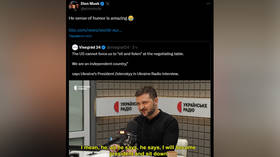REDACTED: 'Clinton email cover-up throwback to Soviet times'

The numerous redactions contained in Hillary Clinton’s emails provided by the government gives the impression there is something to hide. It can make you wonder why they even bother to release these documents, US cartoonist and author Ted Rall told RT.
With just two weeks left till the presidential election, hardly a day seems to go by without the word email cropping up in another news story about Hillary Clinton.
Last week, the State Department released a batch of documents from the time when Clinton served as Secretary of State. Research by WikiLeaks found Syria was discussed 71 times. The second most discussed topic was Islamic State with 132 mentions. But it was Russia and President Putin who were chatted about most frequently with 178 emails.
American columnist and author Ted Rall gave his thoughts on this and other aspects as the US presidential election heads into the final furlong.
RT: Russia has become a major theme in the US presidential campaign far more than in previous elections. What's changed? Does the so-called Russia card in the US election really help to sway American voters?
Ted Rall: I don’t really think so. In many respects, Hillary Clinton - although ahead in the polls - really should be further ahead. She is really running a campaign that feels like something out of the 1990s more like the kind of campaign that her husband would have run maybe in 1992 or1996. It is just not something that seems to be resonating. Hillary Clinton’s campaign continues to throw a lot of Russia-bashing and Putin-bashing against the wall. Most recently, with the DNC and Podesta leaks, we are being told over and over both by the debate moderators in the three national presidential debates, as well as by the mainstream media, corporate media sources that it is just a given that Russia was behind the hacks and Russia is trying to influence American elections. Setting aside the fact that it is a distraction, a pivot to try to distract from the content of the leaks, there has not been even the slightest evidence, much less proof, presented to the American people in order to back that up. We’ve got leaks supposedly from the intelligence community in the US that say that supposedly Russia was behind it. This is Journalism 101. I can’t believe that we have journalistic outlets - or supposedly journalistic outlets - just taking the government’s word as face value, especially given how credible the CIA was during the run-up to the invasion of Iraq.
RT: WikiLeaks continues to publish Clinton's emails and now the State Department poses as a whistle blower also publishing her emails. Most of the emails that it released are redacted, though. What does releasing the information in this way achieve?
TR: They are supposed to be released. In the US under US law any document - electronic or otherwise - that is generated in the White House or by government offices is by definition tax payer property, it is the property of every American citizen and we have a right to look at it unless it is classified or deals with national security. I suspect that most of these redactions have very little to do with the issues of national security. The redactions always give the impression - mostly valid - that there is something to hide and sometimes it makes you wonder why even bother to release it. It is like a throwback to the Cold War.
A list of the more than 3000 attachments released so far in the #PodestaEmails#HillaryClintonhttps://t.co/txqBHm3nBQpic.twitter.com/vqEgR3tr95
— WikiLeaks (@wikileaks) October 25, 2016
RT: The release came under the Freedom of Information Act. It's almost impossible to learn anything from the emails though, due to the redactions. What are your thoughts?
TR: The Freedom of Information Act (FOIA) was passed during the 1970s after a lot of the scandals that rocked the nation related to Watergate under the Nixon administration and CIA misconduct around the world, but in particular in Latin America as revealed by people like former CIA agent Philip Agee. And the FOIA was meant to provide the American people, and in particular journalists and researchers, with access to documentation and not just documents but any material that is generated by the US government. Unfortunately, in reality the government often fails to comply with legitimate requests, or they comply with the requests, but they do so using half-measures, for example, by using excessive redactions (…) The US government has a serious problem with over-classification and they over-redact. It reveals the nature of the government and how much they trust their citizens.
The only mention of #WikiLeaks on @CNN 's website is BTF and says "US finds growing evidence Russia feeding emails to WikiLeaks" REALLY? lol
— Dom Romano (@wrekoniz3) October 16, 2016
A few weeks ago, I wrote a blog that said “Julian Assange is an idiot.” And I was mad because he seemed to release everything at the same exact time as the Trump tape of him grabbing women’s genitalia was released and I thought that it had all been washed away. I was really hoping that Julian Assange and WikiLeaks had more material to come down the pipe. It turned out that I owe Julian Assange an apology; he is not an idiot. In fact, there has been a steady drip--drip-drip, much in the tradition of the Edward Snowden leaks that have slowly been released by the Intercept over the years. And that is a far more effective way to let the public and journalists process this information. Very clearly, Julian Assange and WikiLeaks have decided that they are going to release these things day by day so that people have a chance to carefully consider them before the election (…)
The statements, views and opinions expressed in this column are solely those of the author and do not necessarily represent those of RT.













